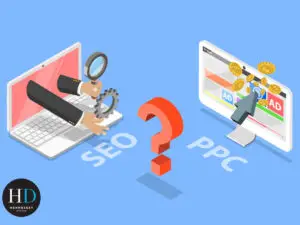 As a digital marketing expert, I’m often asked whether it’s better to use your digital marketing budget to improve search engine optimization (SEO) or to purchase pay-per-click advertising (PPC). The truth is that both can be excellent, so the right answer isn’t that simple. It depends on what makes the most sense for your business.
As a digital marketing expert, I’m often asked whether it’s better to use your digital marketing budget to improve search engine optimization (SEO) or to purchase pay-per-click advertising (PPC). The truth is that both can be excellent, so the right answer isn’t that simple. It depends on what makes the most sense for your business.
Search engine optimization describes actions you can take to improve your website’s ranking on search engine results pages for keywords related to your business. It’s an important part of your marketing strategy, because you want anyone who Googles the name of your business to find your website easily. But beyond that, a strong website with excellent SEO will draw in traffic, which can convert to leads and result in more revenue for you.
The traffic your website draws in through SEO is organic, meaning that users are searching for and finding your website of their own accord. They might type into Google, “physical therapists near me,” or a question related to your business, and when the search results show them a page from your website, they click on it. That means you need to apply strategic tactics to create an effective website that increases the ability to appear at the top of the search results page.
Pay-per-click advertising, on the other hand, describes advertisements you can purchase that will be shown to a targeted demographic who are likely to fit the profile of your ideal lead or client. You pay a small amount each time someone clicks on the ad, rather than paying a larger sum to show the ad to a broader audience. I’m sure you see them all the time. These ads show up at the top of the Google search, and your ad’s rank on that page is determined by the keywords you choose. You can “bid” on keywords, choosing how much you pay based on how competitive the ads for that keyword might be.
Surely you can see how useful pay-per-click ads can be: You’re only paying for more likely leads, people interested enough to click on your ad. And because the ads are targeting a specific audience, you’re more likely to find potential customers. PPC can be further customized with negative keywords, location targeting, video ads, and more.
So which is better—SEO or PPC? The truth is, you likely need both. SEO works cumulatively, so the longer you do it on a consistent basis, the better your results will be. Because of that, it can take a while to increase the views on your website from SEO alone. If you don’t regularly monitor and make adjustments, publish fresh new content, and keep the technical side of your website up-to-date and running smoothly, you might not get very far bringing in new traffic. PPC ads are a great way to bring in traffic right away, as ads can be served up to your target audience immediately.
On the other hand, it’s not a good idea to rely on PPC alone. It’s important to invest in your website to ensure it runs smoothly, has excellent page speed, and provides a good user experience, so that when users do click on your ads, they’re more likely to stay on your website.
Think of it this way: SEO is a long game, like paying a mortgage—it takes a while to pay it off, but you gain equity as you go. It builds on itself, allowing your website to grow and gain more organic traffic as it improves. However, PPC advertising is like “renting” traffic from Google. You get the traffic you need now, but it isn’t cumulative, and if you stop paying for the ads, that stream of traffic will die out.
Even though PPC ads can be incredibly effective, I encourage everyone to invest in their SEO as well. Understand that if you don’t treat your SEO like an ongoing project, it will fail. I like to say it’s like maintaining a lawn—you need to water and mow it regularly.
If you do use PPC ads, ensure that the data communicates with your SEO efforts, such as your website and your Google My Business listing (your listing that appears on Google Maps). Integrating these things is important so that Google’s algorithm understands how they relate to each other, which will help improve your SEO.
Because both SEO and PPC can be excellent methods to increase your website’s traffic and gain new leads, I recommend tracking where your leads are coming from, and the cost to acquire a new client. Gather information about every lead you gain, whether they came from organic search, ads, or something else. Then break down the amount you’re spending on SEO and PPC. Which is more cost-effective for your business? Once you understand the cost of acquiring a new client, you can determine where to focus your marketing efforts to get the maximum results out of your marketing budget.




